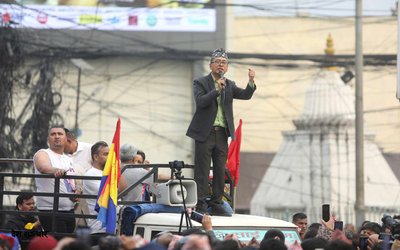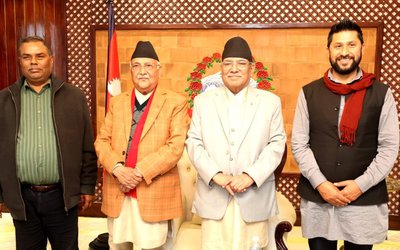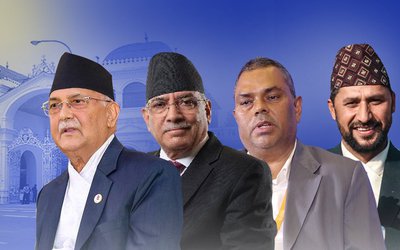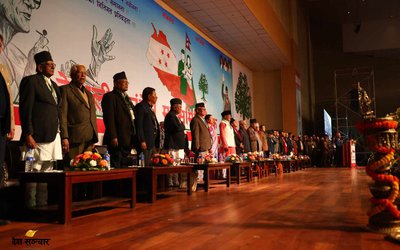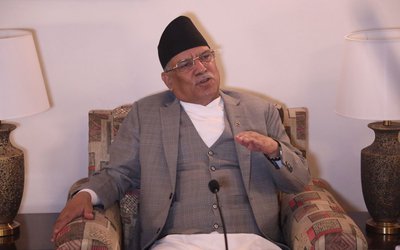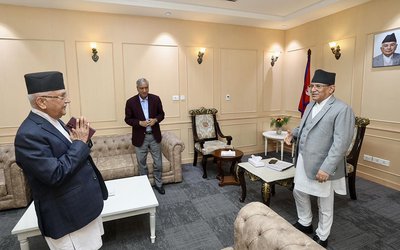As November 22 is coming closer, Nepal’s politics is heading towards a more confrontational course. Political rumors, engineered or spontaneous, are travelling hours after hours pushing the country towards more political chaos and uncertainty. At a time when leaders of major political parties have shown no mood for a compromise, political clashes seem to be inevitable in the days to come.
“If the President dislodges the government, there will be a blood bath. If the prime minister is a caretaker one, President Dr. Ram Baran Yadav, who is also elected by the dissolved Constituent Assembly, does have the same status,” said Agni Sapkota, spokesperson of UCPN-Maoist. “We have reliable reports that President Dr.Yadav is conspiring to do a coup d’état,” Sapkota told New Spotlight.
Although President Dr. Ram Baran Yadav has already made it clear that he wanted to play the role of a guardian of the constitution and he did not have any intention to get involved in active politics, UCPN-Maoist leaders are angry over President Dr. Yadav’s stand that he would not accept the budget ordinance until there was a political consensus.
Finance Minister Barsha Man Pun went a step further. “President Dr. Yadav discussed with high ranking security officials about the possible coup. However, his effort was foiled following the denial by the security officers, including Army,” Barshaman Pun Ananta firmly expressed his view in a daily newspaper.
If the prime minister’s proposed election date for the CA passes on November 22 without the announcement of another new date, a constitutional question will inevitably come up and president Dr. Yadav, willingly or unwillingly, has to jump in. This is a possible scenario that the two main opposition parties, Nepali Congress and CPN-UML, are waiting for. “The president will dismiss the current caretaker government and announce a new all-party national government and a new date for elections,” said CPN-UML chairman Jhalnath Khanal. “We are still trying to woo UCPN-Maoist leaders and prime minister Baburam Bhattarai to resign and pave the way for smooth functioning of the interim constitution.”
Even the Civil Society Group, led by prominent personalities, including senior journalists, human rights activists, lawyers and leaders of professional organizations like the chairman of Nepal Bar Association, Nepal Medical Association, Federation of Nepali Journalists and Nepal Engineering Association, Federation of Non Governmental Organizations and Nepal Teachers Association have called a civil gathering on November 22.
Psychologically, politics is already divided in extremes and political leaders in the ruling and opposition sides are standing their grounds. Given their political stances, there is no sign from either side to budge to prevent the major clashes which will ultimately push Nepal into another phase of constitutional crisis.
External Context
As the late Leo Rose, a prominent American scholar, writes it is a phenomenon for the foreign policy of any society to be strongly affected by domestic political and economic factors. But the reverse principle-namely, that international factors have a strong and often decisive impact on Kathmandu’s domestic politics – is even more apparent. This is a painful fact of life for many Nepalis and one that some of them would prefer to ignore.
Along with the internal environment, Nepal’s politics is often decided by the external environment. The present uncertainty and complexity is not a new one. Situated in a very complex geo-strategic position between two rising but competitive powers, India and China, Nepal’s internal politics is very much linked with its geo-strategic surroundings.
Imminent constitutional lawyer and political analyst Ganesh Raj Sharma is used to seeing Nepal’s political crisis in the regional context. According to him, the competition of two big neighbors is responsible for Nepal’s internal political turmoil of the last six decades. Sharma holds the view that the equally powerful two neighbors have been security shields of Nepal’s continuity as an independent nation for such a long time.
As Nepal’s northern neighbor is in the process of a leadership change, and to the South the government’s popularity is being tested as elections for state assembly are going on in India, Nepal’s current political crisis, which will not make any harm to them, will continue. All the countries around the world were, in fact, watching the fierce competitive elections of the United States of America, and the re-election of President Barack Obama is of great interest throughout the global community. It is somewhat unbelievable to consider that the United States have seen two elections in the time that Nepal has been waiting for one.
Western powers have been making every effort to bring the constitutional process back on the right track in Nepal so that they can support Nepal’s development programs to uplift poorer people. There is a limitation for them.
Power crisis
Following the dissolution of the Constituent Assembly, the political power is nowhere close as political leaders have agreed on everything but seem unable to broker any political deal for the interest of the country.
After May 27, political leaders gathered in various places roaming from party offices, hotels, residences of political leaders and President Secretariat. However, nothing came about of this. Party leaders have spent almost five months indulging in the debate over revival of Constituent Assembly or Elections. They agreed on one agenda, that is, bringing another matter for disagreement. All of the leaders agreed that fresh elections were the only way out. However, they are indulging in a dispute over the leadership of the elections government.
UCPN-Maoist leader, Samyukta Loktantrik Madheshi Front and prime minister Baburam Bhattarai are urging other political leaders to join this government to make it a national consensus government. However, Nepali Congress and CPN-UML are insisting on the resignation of prime minister Baburam Bhattarai. Thus, the political stalemate continues.
Prime minister In Trouble
Among other things, the removal of the prime minister is one of the key demands of the opposition parties. Names like Surya Bahadur Thapa of Janashakti party, Mahanta Thakur of Tarai Madhesh Loktantrik Party and Sher Bahadur Deuba of NC are being floated in the news as probable candidates to replace prime minister Bhattarai. Even the name of civil society leader Damannath Dhungana has been doing the round as a possible candidate to lead the national consensus government to hold the elections in April.
Given the international scenario, the change of prime minister Baburam Bhattarai is unlikely for some time to come. As there are divisions in all major political parties over the selection of the Prime Ministerial candidate, the strong backing of Madheshi Front makes Baburam's position look stronger.
Confusing Situation
Till the elected Constituent Assembly remained, political leaders had a venue to institutionally change the political leadership. Even on the basis of head count, there was a visible power center. Now the situation is that nobody knows where the power is.
In the absence of an open and accountable system to make and break the government, conspiracy and maneuvering will replace all other logic. The recent rumors of a coup d’état or dismissal of present government by president or rumor about UCPN-Maoist capturing state power are the two examples.
“The accusation by some UCPN-Maoist leaders against President Dr. Ram Baran Yadav is conspiratory and engineered,” told Rajendra Dahal, press advisor of the president to New Spotlight. “He has done nothing against the letter and spirit of the Interim Constitution as a guardian of the constitution. Maoists want to divert the attention of people.”
President Dr. Ram Baran Yadav expressed his anger and frustration against party leaders. Party leaders expressed anger and hatred against each other. However, the current situation will continue for some time to come.
Although several political systems and constitutions have come and gone, what Nepal inherits is a continuity of political crisis and political instability. The intensity of political and constitutional crisis in the future will depend on how carefully and maturely Nepal’s political leadership will compromise on issues to prevent such moves.
The first four years of interim period has shown that no alliance can bring the political stability. Whether the all party government led by Girija Prasad Koirala in 2006-08, or another elected coalition government led by Maoist leader Prachanda, CPN-UML, Madheshi Janadhikar Forum, Madhav Kumar led CPN-UML, NC and Madheshi alliance, Jhalnath Khanal led CPN-UML, Madheshi Forum and Maoist alliance or present UCPN-Maoist and Madheshi alliance, no alliance overcame the instability. Even though all the parties have agreed to form the national consensus government, the words won’t be translated into action easily. Breakaway CPN-Maoist has already made it clear that they will not accept the incumbent establishment leaders and the possible alliance of Madheshi Forum and Janjatis, raising more challenges.
Nepal has already paid a heavy price due to the failure of its leadership to comprehend the situation. Force of instability is there and will be there for a long time to come. However, the coming political situation will be determined by how calculative and mature political leaders will be. If political parties are unable to announce the next election date to avert the constitutional crisis, the history will repeat and the politics will go back to the stage of 2002.
- TANAHU HYDROPOWER PROEJCT: A Significant Achievement
- Apr 15, 2024
- AMBASSADOR HANAN GODAR: Sharing Pain With A Nepali Family
- Mar 30, 2024
- VISIT OF KfW AND EIB TO NEPAL : Mission Matters
- Mar 25, 2024
- NEPAL BRITAIN SOCIETY: Pratima Pande's Leadership
- Mar 24, 2024
- NEPAL ARMY DAY: Time To Recall Glory
- Mar 15, 2024

